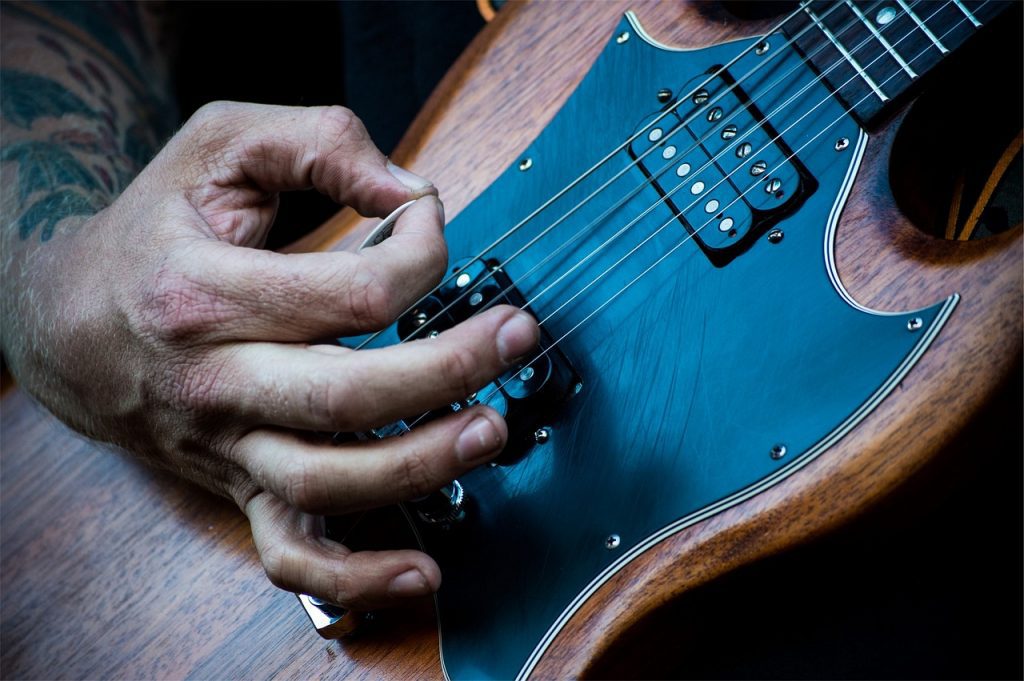Guitar picks are necessary for acoustic and electric guitars. However, like anything else, they can wear out over time, potentially affecting their performance. And some picking techniques and habits can also lead to wear and tear. So how long do guitar picks last? And which picks are the most durable?
How long do guitar picks last? Most standard plastic picks have a lifespan of around a few weeks to a month, give or take, depending on how often you play. However, not all picks have the same durability, and some may be used repeatedly over a period of years with no noticeable wear.
What is a guitar pick?
A guitar pick, also known as a plectrum, is a small, flat object used by guitarists to strum or pluck the strings on a guitar. Typically, picks are made of plastic, but they can also be made from other materials such as metal, wood, or bone.

Picks come in a variety of shapes, sizes, and thicknesses, each of which can impact the sound produced by the guitar. Thicker picks are often used for single-note lead lines or heavy metal-style chugging, while thinner picks are often preferred for strumming chords in acoustic or certain types of electric guitar playing.
AKAI Professional MPK Mini MK3

AKAI Professional MPK Mini MK3
Do guitar picks wear out?
Yes. Guitar picks wear out. This might happen through general wear and tear or spontaneously after an unusual or uncomfortable strum. As a pick wears down, it will often develop a rounded or uneven edge, which can affect the tone and playability.
A guitar pick’s lifespan might vary greatly, predominantly depending on the frequency of its usage. The more it’s used, the faster it will deteriorate. Over time, as the pick starts to wear out, you’ll notice it becoming less pleasant to use and less functional.
How long does a guitar pick last?
The typical guitarist will get a couple of weeks to a month out of a pick if they play for an hour or so every day. However, for pros who spend extended periods in the studio, picks can wear out more quickly. Styles that involve heavy or aggressive strumming or fast, heavy metal-style picking can also wear out a pick much faster.
If you play guitar often enough to worry about this, invest in high-quality, long-lasting picks and get plenty of extras. It’s always a good idea to have several picks on hand so that you can replace one as soon as it starts to show signs of excessive wear.
Are some picks more durable than others?
Yes. Some picks are more durable than others. Not all musical instruments are created equal. As a result, certain picks will wear out and shatter more quickly than others. Picks with a thickness of 0.7 mm or less are more likely to break easily and need more frequent replacement.
Despite their fragility, thinner picks provide a different tone and feel, which is why some guitarists prefer them.
Despite their fragility, thinner picks provide a different tone and feel that some guitarists prefer. They tend to produce a lighter, softer sound that can be great for strumming, particularly on acoustic guitars.
Guitar picks, or plectrums, plectrums come in various shapes and sizes, each with its own advantages. Ultimately, the way it sounds and feels for you is more important than how long it will last. But if you’re lucky enough to get a sturdy pick, you won’t have to make frequent replacements.
What are guitar picks made of?
The material of a guitar pick significantly influences its tone and life expectancy. Guitar picks can be crafted from either natural or synthetic materials, each with its own set of advantages and disadvantages.
Natural pick materials
Some examples of natural substances used for guitar picks include:
- Buffalo Horn
- Stone
- Bone
- Metal
- Abalone Shell
- Coconut Shell
- Surfpick Wood
- Tortoiseshell
- Farmed Turtle Shell
Guitar picks made from natural materials like buffalo, tortoise, and stone can produce exceptionally stylish sounds. However, superior sound quality comes with a hefty price tag, which is a common trait for most natural materials. Not only are they expensive, but only a few guitarists can get a hold of them.
Synthetic pick materials
Most picks produced nowadays are constructed from synthetic materials such as:
- Celluloid
- Nylon
- Thermoplastic
- Carbon Fiber
- Delrin, Delrex, and Acetal
- Acrylic
- Tortex (Acetal)
- Ultem and Ultex
- Wegen Picks (Acetal)
- Artificial Ivory (Tuscq)
What factors affect a pick’s durability?
A guitar pick’s durability depends on a variety of factors. To gain a better understanding, let’s delve deeper into some of the factors that will affect how long your picks last.
1. Thickness
This is a major factor that affects the plectrum’s durability over time. More robust materials are less likely to wear out rapidly. In addition, they will be more difficult to crack open, making them more durable. If durability is a priority, thick picks are a great option.
2. Material
Different types of picks use different materials, and the durability of your plectrum (pick) depends greatly on the material it is constructed from. Harder materials, as one would expect, tend to degrade at a slower rate. For instance, many picks are made of plastic, but the tougher the plastic, the longer it will endure.
3. Size
Picks come in various shapes and sizes. A pick with a sharp point will wear down to a rounded edge with use, particularly if used for aggressive or heavy playing. Conversely, picks with rounded tips may not experience the same type of wear but could still become more rounded with extended use.
Larger picks have more surface area and might last longer simply because there’s more material to wear down. However, they could also be more prone to cracking or breaking if they’re not flexible enough to withstand heavy playing.

4. Shape
A sharper pick tip results in a louder sound, but it may easily break off. As a result of the reduced hitting area, they might wear out quite fast. In contrast, spherical picks are safer since they are less prone to crack.
5. Playing style
Your playing style is a key contributor to how long your guitar pick lasts. It will usually survive longer if you stick to simple strumming and picking techniques. However, methods like rapid picking, tremolo, or slides may cause it to wear down faster than usual.
When should you replace a guitar pick?
So, when should a guitar pick be replaced? The edges are rounding off. That’s a good indicator. Additionally, you will know your guitar pick has worn out when it has:
- Grooves
- Frayed edges and loose material
- Cracks
- Stress marks
If you play more aggressively, check the edges of the plectrum for chips and cracks. These are undeniable proof that your pick should be replaced.
If you want even more tips and insights, watch this video called “Gravity Guitar Picks – How long do they last” from the Larry Riker YouTube channel.
Frequently asked questions (FAQ)
Do you still have questions? Below are some of the most commonly asked questions about how long a guitar pick lasts.
When should you throw a guitar pick?
If a guitar pick is broken or showing substantial wear, you should replace it. Picks with a thickness of 0.7 mm or less are more likely to break easily and need more frequent replacement. Inspect your pick for wear and tear regularly and always before beginning a new recording or song.
Do picks get worn out?
Yes. Yes. Guitar picks wear out. This might happen through general wear and tear or spontaneously after an unusual or uncomfortable strum. A guitar pick’s lifespan might vary greatly. How frequently you put it to use matters more than how long you have had it.
Do picks get dull?
Yes. Standard guitar picks may wear out after some time. While playing, “pick slides” may wear away the edges, sharpening them and causing the strings to snag. Also, the point of the plectrum may become more rounded over time, making it harder to pick accurately.
Conclusion
With so many factors that can affect the lifespan of a guitar pick, it is important to know how you want to handle your picks. For most musicians, having fresh and clean guitar picks is like having a spa session every time they play. While some may choose to buy new ones on a regular basis, others might keep their old gloves in storage with no issues whatsoever!
Key takeaways
This article covered whether guitar picks wear out, how long they last, and whether some picks are more durable than others. Here are some key takeaways:
- A guitar pick’s lifespan might vary greatly based on several factors.
- Given enough time, all guitar picks will wear out no matter how sturdy the material is.
- Using your pick more often will wear out and break sooner than the average player’s.
- Not all pics are created equal.
- You may expect a longer lifespan from a guitar pick made from a more durable material, so pay attention to its tip’s thickness, shape, and feel.
- It is generally agreed that the selections from Dunlop’s tortex are some of the best picks.
- The electric guitar soloist should go up in gauge to have a thicker pick with more durability.
So, how many months does your guitar pick last? And did I cover everything you wanted to know? Let me know in the comments section below. I read and reply to every comment. If you found this article helpful, check out my full blog for more tips and tricks on music production. Thanks for reading, and never stop making music.















